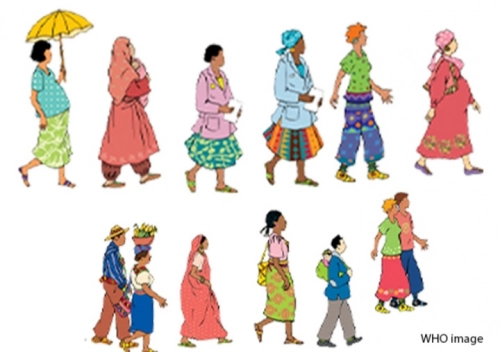profile/27862349031898762_status_745d986b14ac4f119201a071ed4bc97b.jpg.webp
Emelie

Paracetamol Abuse Could Damage Liver, Health Commissioner Warns Nigerians
~1.8 mins read
The Commissioner for Health and Human Services in Benue, Dr. Joseph Ngbea, has cautioned Nigerians against abusing drugs like paracetamol.
Ngbea stated this on Monday while speaking during the War Against Drug Abuse programme, organised by Eunice Spring of Life Foundation, in partnership with the National Drugs Law Enforcement Agency in Makurdi.
The commissioner stressed that the abuse of paracetamol could affect the liver negatively.
He urged Nigerians to keep strictly to prescriptions to avoid abuse of drugs and subsequent damage to their body systems.
He further disclosed that the Ministry in partnership with ESLF and NDLEA would put up a proposal to the state government to build rehabilitation centres in all the three Senatorial Districts of the state.
He pledged that the ministry would sustain its partnership with ESLF and NDLEA to ensure that WADA achieved success in the state.
Meanwhile, Governor Samuel Ortom of Benue has attributed the rising cases of insecurity in the country to the increase in substance abuse.
Ortom said drug abuse had dealt heavily with society, stressing that all Nigerians must come together to tackle it head-on.
He commended his wife, Dr. Eunice Ortom, for championing the fight against drug abuse in the state and country at large.
Also speaking, Dr. Eunice Ortom advised Nigerians to rub their minds more on how to tackle the menace of drug abuse.
“Drug abuse is a global challenge and people should not allow it to ruin them, steal their joy or happiness.
“For President Muhammadu Buhari to launch WADA, it means that the menace needs to be tackled with all seriousness and determination.
“Almost everyone is affected by drug abuse in one way or the other,” she said.
She encouraged people not to write victims off rather, they should help them because they needed love, care, affection, assistance, advice, prayers, encouragement, and counselling.
The state Commander, NDLEA, Mrs. Esther Musa, lamented that the cultivation of cannabis had taken over the cultivation of yams, cassava, maize, and others in the state.
Musa called on all and sundry to assist the agency to nip the menace in the bud by volunteering information to her.
The Coordinating Programme Officer, ELSF, Miss Karen Yankyaa, said that a survey conducted in 2020 revealed that 14.4m Nigerians used and abused drugs.
profile/27862349031898762_status_745d986b14ac4f119201a071ed4bc97b.jpg.webp
Emelie

Why Women In Nigeria Have Low Life Expectancy -Gynaecologist
~2.8 mins read
An Obstetrician and Gynaecologist at the Aminu Kano Teaching Hospital, Kano State, Dr. Labaran Aliyu, has said that the life expectancy of women in Nigeria will remain low until the government addresses poverty and illiteracy.
Dr. Aliyu says though there are many reasons for the low life expectancy of women in the country, the most important two are illiteracy and poverty.
Speaking in an interview with HealthWise, the gynecologist identified poverty and illiteracy as the root causes of low life expectancy in women.
According to the 2020 World Population Data Sheet, the life expectancy of females in the country is 56 years while that of males is 54 even as the national figure was put at 55 years in a population of over 200m people.
The maternal health expert explained, “There are many reasons for the low life expectancy of our women, but the most important two are illiteracy and poverty. Whatever reason you want to look at, you will ultimately come back to these two. So these are the root causes.
“In a poor family for example, if a woman is pregnant and develops complications and there are no resources to access healthcare, what will be the result? She will die from the complications.
“Although, sometimes, it is not about not having enough resources to access healthcare, but because of Illiteracy, many don’t know what to do when they are sick or what not to do to get better.”
According to the gynaecologist, looking at Illiteracy in the context of maternal health, it is important women know what they need to eat to be healthy.
“A lot of cases that we see in the hospitals and even in the communities are evidence of Illiteracy. For instance, if a woman is sick in the family and the sickness has a diagnosis, you can say this is the cause of that sickness. But because of illiteracy, it will be attributed to some other trivial issues based on the belief in the community.
“She will stop seeking care from the health providers and the sickness will worsen, ultimately she will die of the disease”, he said.
Aliyu maintained that the poverty rate in the country is too high, stressing that if the issues are not properly addressed, a lot of women will continue to die from preventable causes and life expectancy will remain low.
According to the National Bureau of Statistics in its Poverty and Inequality report 2019, 1 in 10 or more than 82.9 million Nigerians live in poverty.
Also, the World Bank says 96 million Nigerians will be living in poverty by 2022.
Besides poverty and Illiteracy, the maternal health expert identified high fertility rates and poor nutrition as other factors responsible for the low life expectancy of women in Nigeria.
“Our fertility rate is very high. The fertility rate is part of the problem because the more children the women have, the less they have to cater for themselves.
“Again, in some communities that don’t accept family planning, women in such communities keep having children and exposing their lives to risk,” the associate professor said.
On what could be done to improve the life expectancy of women in Nigeria, Aliyu said the government has a role to play and the best role they can play is by providing an enabling environment for people to earn a decent living.
“If the government cannot provide jobs, they should provide an enabling environment by which individuals can be engaged in a specific trade.
“The government should provide training for people to enable them to have a vocation. Education is key. So, the government should make education free, available and accessible for women.
“We need community education, that is creating awareness in the communities”, he said.
Advertisement

Link socials
Matches
Loading...
